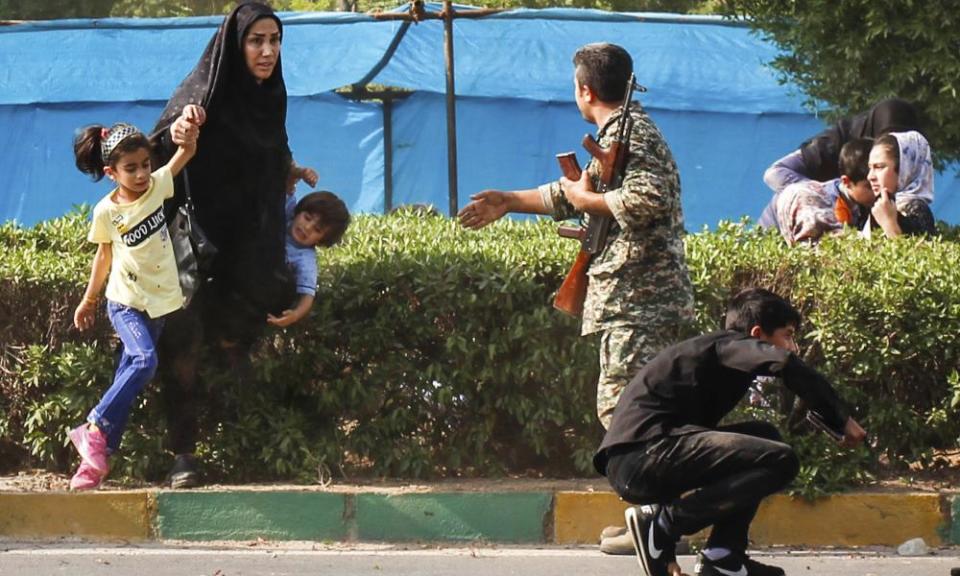Iran says response to terrorist attack on military parade will be 'crushing'
Iran has vowed a crushing response to Saturday’s terrorist attack on a military parade that killed at least 29 people, including conscripts and children, as it accused its US-backed regional rivals of incubating insurgent separatist groups.
In the deadliest terrorist attack Iran has seen in years, four assailants disguised in military uniforms opened fire when military personnel were marching in front of a viewing platform in the southwestern city of Ahvaz.
The attack took the lives of soldiers, many of whom were on their two-year obligatory military service, as well as civilians, including children and a veteran of the 1980s Iran-Iraq war who was killed in his wheelchair. There are conflicting reports about the death of one journalist.
One image from the aftermath of the attack that went viral online showed a soldier carrying a wounded young boy away from the scene. The four-year-old, identified as Mohammad-Taha Eghdami, later died in hospital – his dead body was shown on state TV on Sunday.
“It is perfectly clear to us who were behind the attack and what their affiliation is,” Iran’s president, Hassan Rouhani, said on Sunday before travelling to New York for the UN general assembly.
Rouhani did not single out a specific country, but other officials have pointed their finger at Saudi Arabia, Iran’s arch-enemy, which Tehran accuses of hosting and aiding separatist and sectarian groups. Ahvaz, the capital of Shia-majority Iran’s oil-rich Khuzestan province, is home to the country’s Sunni Arab minority.

“Those who keep repeating their bogus stance on advocating human rights must be held accountable; all those small mercenary countries in the region which the US backs and provokes,” added Rouhani.
Iran’s supreme leader, Ayatollah Ali Khamenei, said on Saturday that “this crime is a continuation of the plots of the regional states that are puppets of the United States, and their goal is to create insecurity in our dear country,” according to a statement posted on his official website.
The attack was immediately claimed by an Arab nationalist separatist group called the Patriotic Arab Democratic Movement in Ahvaz. Its spokesperson told the London-based exiled TV network Iran International that the attack was aimed at “the Revolutionary Guards and the armed forces of the Islamic Republic”. Iran’s state news agency said the group was “Saudi-affiliated”. Later on Saturday, Islamic State (Isis), also claimed responsibility.
On Saturday night, Iran summoned the UK envoy over the conduct of Iran International, which is run by a company owned by a Saudi national, because it gave airtime to the spokesperson of the group behind Saturday’s terrorist attack. Iran’s ambassador to the UK announced he would lodge a complaint with the regulator, Ofcom.
Tehran’s foreign ministry summoned UK, Dutch and Danish envoys over “Iran’s strong protests over their respective countries’ hosting of some members of the terrorist group”, officials said. Iran urged Denmark and the Netherlands to extradite the terrorist attack’s “perpetrators and their accomplices” to stand trial, the state news agency said. The spokesperson of the separatist group that took responsibility for the terrorist attack gave TV interviews from Denmark.
Iran’s objection to the Netherlands appears to stem from the fact that a number of Arab secessionists live there. Last November, Iranian Arab secessionist Ahmad Mola Nissi was shot dead in The Hague in a suspected political killing.
Eskandar Sadeghi-Boroujerdi, a postdoctoral research fellow in modern Iranian history at University of Oxford, said Iranians had been furious on social media over a perceived double standard in western media coverage of “what Iranians overwhelmingly see as a terrorist attack, with the sole aim of sowing fear and ethnic divisions”.
“It comes after decades of vilification in which Iranians are often depicted as the agents of terrorism, or are expected to ‘prove’ themselves as ‘good’ Middle Easterners deserving of international sympathy and empathy,” he said.
“The fact that Iranians are under severe economic pressure at home, and regularly demonised by the Trump administration in concert with a longer-standing history of grievances in which the west can be seen as turning a blind eye, are surely key to understanding a lot of the popular anger we’re seeing on social media about alleged double standards.”
A number of Arab media close to Saudi Arabia portrayed it as merely a legitimate attack targeting military officials, including members of Iran’s elite Revolutionary Guards. Al Wesal TV, a Saudi-based Sunni Islamic educational channel encouraging Shia Muslims to convert to Sunni Islam, wrongly referred to the Iranian city as “occupied Ahvaz”.
The state-run Press TV published an article headlined “Reactions to attack: How West sees it differently”, protesting that some western media were giving scant coverage, dropping the term “terrorist attack” despite civilian casualties, or portraying it as a merely an attack on military personnel.
Western diplomats in Tehran, including the British, German and Austrian ambassadors, condemned what they said was a terrorist attack. The US state department said “the United States condemns all acts of terrorism and the loss of any innocent lives”.
The US ambassador to the United Nations, Nikki Haley, said Iranian leaders should look closer to home. Asked about Rouhani’s comments, Haley told CNN: “He needs to look at his own base to figure out where that’s coming from. He can blame us all he wants. The thing he’s got to do is look at the mirror.”
The US secretary of state, Mike Pompeo, echoed this. “When you have a security incident at home, blaming others is an enormous mistake,” he told Fox News.

 Yahoo News
Yahoo News 